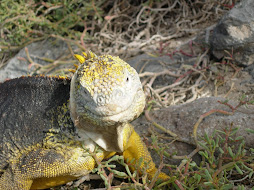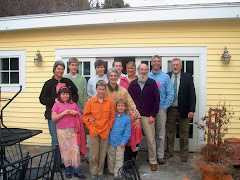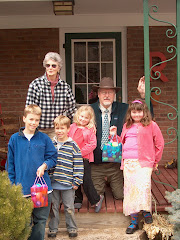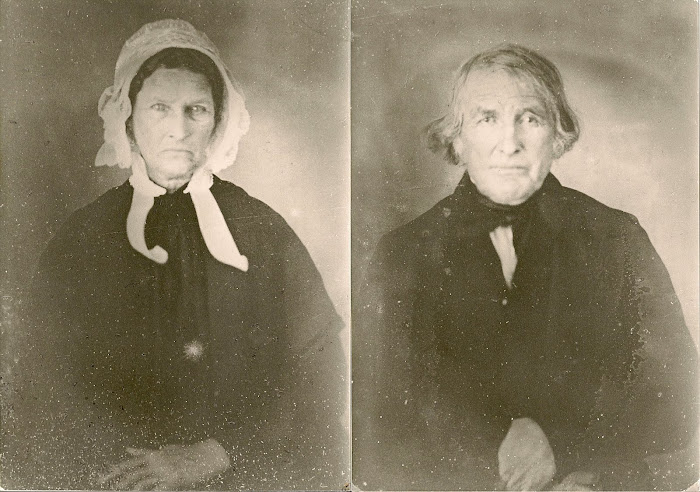We’ve been constructing lists of all the family surnames for each branch--it’s exhaustive, of course, but awfully fun to imagine the possible connections. Dominick’s conclusions: “We’re related to at least six NBA basketball players: Tony Parker, Kwame Brown, Steve Nash, Jason Richardson, Kobe Bryant, and LeBron James.” Ah, if it all worked that way. We’ve long admired Matt Damon from afar (and for a while, Johnny Damon, too, before he traitorously joined the ranks of those bad boys in pinstripes) and have even researched a possible genetic link to his Damon family (it must go way back, even before a seven-year old John Damon Jr. came to Plymouth with his sister Hannah and their uncle and guardian William Gilson in 1628, and spawned all of us Rooster Pooster Damons...but there may be some connection to Matt’s line of Damons—if we look at John’s father, John Damon Sr., who lived in the Faverhsam area in Kent, England).
It’s been fun, too, to trace the evolution of particular family surnames. For instance, if we look at the name McCurdy (Janet McCurdy married Robert Lithgow; their daughter Martha married Lt. James Dunning; their daughter Mary married William Reed Jr.) on the Reed side of the family, it is interesting to see how the name captures the evolution of surnames. In the late 14th century, a man named Ruari, or Roderick, dwelled on the Isle of Bute in Scotland. One name was sufficient. His son, named Macruari (son of Ruari), also had a son, named Gilkrist, who by this time had taken on the last name of his father, as well as the title Chieftan—of the Makurerdy clan, we presume. Clearly, the Isle of Bute was growing more crowded with more clans, and all those Donalds and Daniels and Fingals and Gilkrists needed more distinction, as clan warfare escalated.
With each generation, as the name is passed down from father to son (and we hope, to daughter, too), the name changes shape bit by bit, becoming more refined and distinct. Several generations later, Donald Makurerdy would have a son Donald, who would change his last name to MacKirdy. It is his son, Fingal, to whom this blog is dedicated. Fingal’s son Donald’s son Daniel’s son Daniel (have we lost you yet?) changed the name to McCurdy after he left Scotland for County Antrim, Ireland. It was Daniel McCurdy’s daughter Janet who left Ireland for the coast of Maine all those years ago.
Before Janet's time, there was a unique system of naming girls in Scotland. The feminine version of Mac, was Nc, an abbreviation of “nighean mhic” or “daughter of Mac”, which was attached to a woman’s surname, and sometimes further abbreviated to N’. If you care to read more about Scottish surnames, click here.
In the rest of the world, the use of true surnames—hereditary names used to distinguish one person from another—began first in southern areas of Europe, and then spread to the north. As well, the trend began with the nobility, sweeping through the northern gentry last. And, as we have seen many times, there were many people who retained altogether too many names, like Thomas Read did in 1575, when he was also known as "Clerk of the Green Cloth." Whatever that means.
We’ve researched many of our family surnames to see what they mean and where they are from. Here is a sampling of our findings:
SEWARD ~ High admiral, who kept the sea against pirates; from the sea, and ward; a keeper. This would be an example of a place name that was perhaps combined with an occupational name.
SHOVE ~ Variation of the Dutch “schave”, and from Middle English “schove”, probably from Old English “scufa”, to thrust or push. (We think, perhaps, that the earliest Shove was a playground bully, and his naming was an example of a negative descriptive name)
LAWTON ~ Settlement on or near a hill, or by a burial mound. Hlaw=hill, burial mound; Tun=enclosure, settlement. Habitational, or place name. Similar to Hurst, which is old English for a wooded hill, or Nash, a topographical name for someone who lived by an ash tree.
GARDNER ~ From Gartner (German); and Gardener, which in the middle ages would have been a cultivator of edible produce in an orchard or kitchen garden (as opposed to a frivolous ornamental garden). Occupational name, as Mason is.
DAMON ~ English, Scottish, Classical Greek, and then there’s this: daman="to kill" (ouch!), or from the French, D’Amont, “one who lives uphill.” That sounds a bit better. Could this be an example of a descriptive surname, one that grew from an earlier association with an ancestor who was a killer? Yikes. Fits Matt Damon’s Jason Bourne pretty well.
REED ~ Comes from Read, Reade and Rede before. Middle English for having red hair or a ruddy complexion, or living in a woodland clearing. In addition to being a descriptive name, Reed can also be a habitational name. I suppose that the original Rede might have satisfied all three requirements. Oh! You mean that William, with the red hair and skin, who lives in the woodland clearing down the way. You say he had a few too many last night? And later: Oh! You mean William the Red. Yea, that'd be he, pulling his beard out over nothing. And still later still: Oh! You mean William Rede. He is a good fellow. Ay, I do. And I did all along.
WATT ~ A short form of Walter. Scottish and English. Patronymic. Funny, we thought that it might have come about because some ancestor-dude was hard of hearing. What? Watt?
HITCHCOCK ~ “Hitch” was a pet name for Richard (no doubt, because there were so many of them during the 14th century), and “cock” meant young man. Put them together, and you can imagine a young man named Richard whom everybody called Hitch and who had a son named Richard (because, really, back then, what else was there to name your son?) whom everybody called Hitchcock…and all the babies were little Hitchcocks, and it stuck, and the rest is history!
ROOT ~ There’s much more to this tidy little name than we expected! Root comes from the English nickname for a cheerful person (rote=glad). As well, it was an occupational name for one who played the rote, an early medieval stringed instrument. And finally, it was a topographical name for someone who lived by a retting place.
As for MCCURDY, it means skilled seaman, a good thing to be when you’re traversing the rough seas and rocky channels along the Isle of Bute!
Go Behind the Name to research your own surname.
--ESG with DRP
Subscribe to:
Post Comments (Atom)





No comments:
Post a Comment